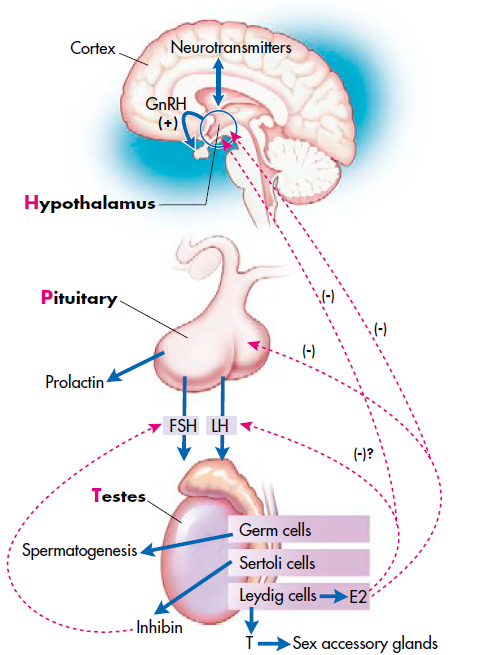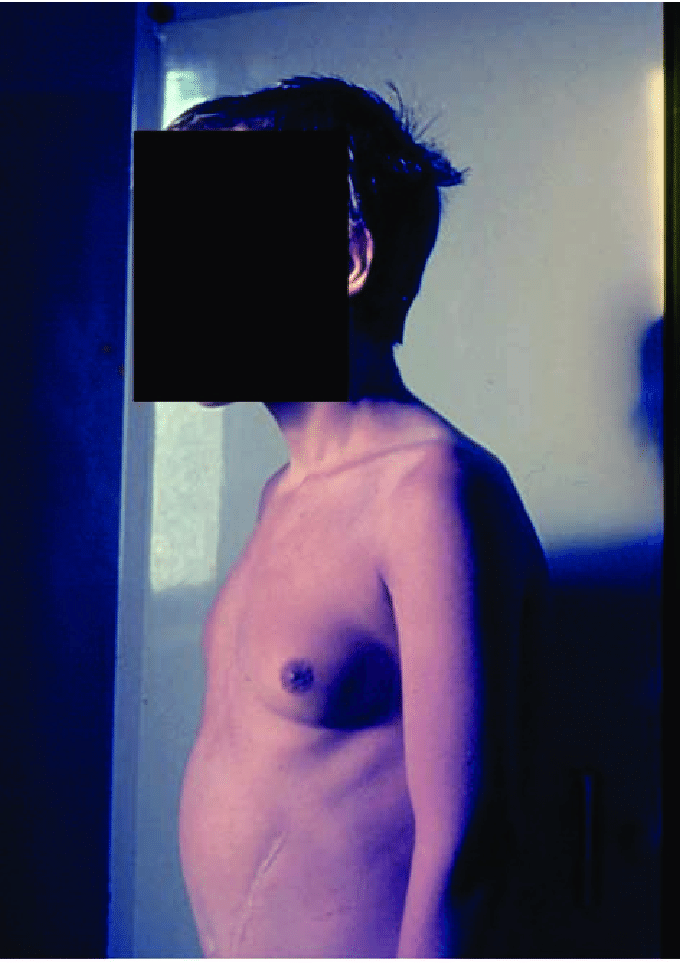Hypogonadism
Content of This Page
1- Introduction
2- Causes
3- Symptoms
4- Stages of The Disease
5- Treatment
6- What Should You Avoid
Introduction
Hypogonadism is a condition where the gonads (testes in males, ovaries in females) produce insufficient levels of sex hormones, such as testosterone in males and estrogen and progesterone in females. This hormone deficiency can lead to symptoms like reduced sexual desire, infertility, and other physical and emotional changes.

Causes
1. Primary Hypogonadism (Gonadal Failure):
- Genetic Conditions:
- Klinefelter Syndrome: A genetic disorder in males where there is an extra X chromosome.
- Turner Syndrome: A genetic condition in females where one X chromosome is missing or partially missing.
- Autoimmune Disorders: Conditions where the immune system attacks the gonads.
- Infections: Such as mumps or other viral infections that damage the gonads.
- Trauma or Surgery: Injury or surgical removal of the testes or ovaries.
- Radiation or Chemotherapy: Cancer treatments that affect the gonads.
- Testicular or Ovarian Failure: Due to aging, toxins, or other factors.
2. Secondary Hypogonadism (Hypothalamic or Pituitary Failure):
- Pituitary Disorders: Tumors or diseases affecting the pituitary gland that impact hormone production.
- Hypothalamic Disorders: Conditions affecting the hypothalamus, which regulates the pituitary gland.
- Genetic Conditions: Such as Kallmann Syndrome, which affects both the sense of smell and reproductive hormones.
- Chronic Illnesses: Conditions like diabetes, kidney disease, or obesity that can impact hormone levels.
- Medications: Certain drugs that affect hormone production or regulation.
- Stress or Severe Illness: Physical or emotional stress can temporarily affect hormone levels.
Symptoms
In Males:
- Reduced Sexual Desire: Decreased libido or interest in sexual activity.
- Erectile Dysfunction: Difficulty achieving or maintaining an erection.
- Infertility: Problems with sperm production or quality, leading to difficulties in conceiving.
- Reduced Muscle Mass: Loss of muscle strength and mass.
- Increased Body Fat: Accumulation of fat, especially around the abdomen.
- Decreased Bone Density: Increased risk of osteoporosis or fractures.
- Fatigue: Persistent feelings of tiredness and lack of energy.
- Mood Changes: Symptoms such as depression, irritability, or difficulty concentrating.
- Reduced Facial and Body Hair: Decreased growth of facial and body hair.
- Gynecomastia: Enlargement of breast tissue in males.
In Females:
- Irregular or Absent Menstrual Periods: Changes in menstrual cycle or complete absence of periods.
- Infertility: Difficulties in conceiving due to hormonal imbalances.
- Hot Flashes: Sudden feelings of warmth, especially around the face and upper body.
- Vaginal Dryness: Dryness and discomfort in the vaginal area.
- Decreased Libido: Reduced interest in sexual activity.
- Fatigue: Persistent tiredness and lack of energy.
- Mood Changes: Symptoms such as depression, anxiety, or irritability.
- Bone Loss: Increased risk of osteoporosis and fractures.
- Skin Changes: Thinning skin or changes in skin texture.
- Hair Loss: Thinning or loss of hair on the scalp or body.
In Both Sexes:
- Reduced Bone Density: Increased risk of osteoporosis and fractures.
- Fatigue: Persistent tiredness and lack of energy.
- Mood Changes: Depression, irritability, or difficulty concentrating.

Stages of The Disease
1. Early Stage (Subclinical or Mild Hypogonadism):
- Symptoms: Mild symptoms or none at all. Hormone levels may be slightly below normal, but the condition may not significantly impact daily life.
- Diagnosis: Often identified through routine blood tests showing slightly low hormone levels but may not yet cause noticeable symptoms.
2. Moderate Hypogonadism:
- Symptoms: More noticeable symptoms start to develop, such as reduced libido, erectile dysfunction, fatigue, or irregular menstrual periods. Hormone levels are more clearly below normal.
- Diagnosis: Confirmed through blood tests showing significantly low levels of sex hormones. Symptoms may be affecting daily activities and quality of life.
3. Severe Hypogonadism:
- Symptoms: Severe symptoms become evident, including pronounced sexual dysfunction, significant muscle loss, severe fatigue, mood changes, and infertility. In females, symptoms such as hot flashes, severe menstrual irregularities, and vaginal dryness may occur.
- Diagnosis: Blood tests show very low hormone levels. Symptoms are severe enough to impact overall health and well-being significantly.
4. Chronic or Long-Term Hypogonadism:
- Symptoms: Persistent and severe symptoms that have been present for an extended period. Long-term effects may include increased risk of osteoporosis, cardiovascular issues, and significant psychological impact.
- Management: Requires ongoing treatment and management. Hormone replacement therapy is essential for maintaining hormone levels and alleviating symptoms.
5. Complications (Rare):
- Symptoms: In untreated or poorly managed cases, complications such as severe osteoporosis, cardiovascular disease, or mental health issues might develop.
- Management: Immediate and comprehensive treatment is necessary to address complications and improve quality of life.
Treatment
1. Hormone Replacement Therapy:
- In Males:
- Testosterone Replacement: Administered through injections, patches, gels, or oral medications to restore normal testosterone levels and alleviate symptoms.
- In Females:
- Estrogen and Progesterone Replacement: Given through oral tablets, patches, gels, or injections to manage symptoms such as irregular periods, hot flashes, and vaginal dryness.
2. Addressing Underlying Causes:
- Treating Pituitary Disorders: If hypogonadism is due to a pituitary tumor or other pituitary disorders, treatments might include surgery, radiation therapy, or medications to address the tumor.
- Managing Hypothalamic Disorders: Treating conditions affecting the hypothalamus, which might involve medications or other interventions based on the specific disorder.
- Correcting Nutritional Deficiencies: Addressing deficiencies that might impact hormone production, such as zinc or vitamin D.
3. Lifestyle and Supportive Care:
- Diet and Exercise: A balanced diet and regular exercise can improve overall health and support hormone balance.
- Stress Management: Techniques such as relaxation exercises, counseling, or therapy can help manage stress, which may impact hormone levels.
- Regular Monitoring: Ongoing evaluation of hormone levels and symptoms is necessary to adjust treatment and ensure effectiveness.
4. Medications:
- For Secondary Hypogonadism: Medications that stimulate hormone production or improve hypothalamic or pituitary function might be prescribed, such as clomiphene citrate or human chorionic gonadotropin (hCG).
5. Surgical Interventions:
- For Tumors: Surgical removal of tumors affecting hormone production or gland function may be necessary.
- For Structural Issues: Surgery might be required if there are anatomical problems affecting hormone production.
6. Management of Complications:
- Osteoporosis: For those with decreased bone density, medications or supplements like bisphosphonates or calcium and vitamin D may be recommended.
- Cardiovascular Health: Monitoring and managing cardiovascular risk factors, including cholesterol levels and blood pressure, may be necessary.
7. Patient Education and Support:
- Understanding the Condition: Educating patients about hypogonadism, treatment options, and lifestyle modifications to manage their condition effectively.
- Counseling: Providing psychological support or counseling to address mood changes, sexual dysfunction, or other impacts on mental health.
What Should You Avoid
- Excessive Alcohol Consumption
- Smoking
- Certain Medications
- Chronic Stress
- Unhealthy Diet
- Sedentary Lifestyle
- Excessive Iodine
- Self-Medication
- Extreme Dietary Changes
- Ignoring Regular Check-Ups